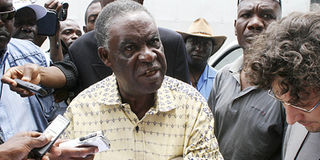Zambia’s Rupiah Banda declared winner in presidential poll

Zambian opposition leader Michael Sata leaves an election results centre in Lusaka. Despite holding a slim lead in the presidential election on Saturday, the opposition leader was defeated by acting President Banda in final results announced on Sunday PHOTO/ REUTERS
What you need to know:
- Election was fair, says opposition leader as security stepped up in the capital city
LUSAKA
Acting President Rupiah Banda has won Zambia’s presidential election, defeating challenger Michael Sata by a narrow margin, the country’s electoral commission announced on Sunday.
Mr Banda, a pro-business centrist who became acting president after Levy Mwanawasa died of a stroke in August, won 718,359 votes versus 683,150 for Sata, according to final results from 150 constituencies.
Mr Sata, the leader of the Patriotic Front, has accused officials of rigging the poll and vowed to contest the result.
Late Sunday, Mr Sata’s party refused to recognise results of the election and said it would demand a recount.
“Our stand is still that we do not recognise the election of Rupiah Banda as something reflecting the will of the people of Zambia,” Mr Given Lubinda, a spokesman for Sata’s Patriotic Front, said. “We are going to ask the court (on Monday) to grant an order to scrutinise and recount the votes.”
Earlier, Ms Florence Mumba, chairwoman of the electoral commission, released the results.
Earlier Sunday, Mr Banda’s ruling Movement for Multi-Party Democracy said it is confident that Mr Banda’s lead was unassailable.
Inauguration
Government officials told Reuters that Mr Banda would be inaugurated today in the capital.
Mr Sata’s party said the vote was marked by discrepancies between vote tallies and the number of voters on registration lists.
Zambia is Africa’s largest copper producer and any political turmoil could unsettle foreign investors, particularly those in the mining sector.
Mr Sata, a populist with strong support among workers and the poor, made the same charge two years ago when he lost the presidential election to Mwanawasa.
Authorities have said the army is ready to prevent unrest in the country, one of the most politically stable in Africa.
Election officials said the count had proceeded slowly, but defended their actions.
“The vast distances and poor terrain have created difficulties in delivery of election materials (ballots),” Ms Mumba said.
Independent election monitors have noted some irregularities in the poll but have stopped short of condemning the vote.
About 45 per cent of the 3.9 million registered voters cast ballots in the election.
The winner faces the formidable task of matching Mwanawasa’s strong record of fiscal discipline, praised by Western donors and investors, and fighting corruption, two rare successes in Africa.
The vote is also seen as a test of Zambia’s commitment to multi-party democracy, restored in 1990 after 18 years of one-party rule under Kenneth Kaunda, but neither Banda nor Sata is expected to reshape the political landscape dramatically.
Tension rose in the capital Lusaka, a Sata stronghold, as the opposition’s allegations of fraud became more strident.
A Reuters witness said large numbers of armed police were patrolling the city.
On Saturday, Mr Sata stormed into a Lusaka conference hall where the results were being announced, accusing the electoral commission of padding Banda’s vote total.
“I have evidence that results are being inflated ... They cheated me in 2006 and they want to do the same.”
It is unclear what Mr Sata and his supporters will do now that Mr Banda has been declared the winner.
Authorities have said the army is ready to prevent unrest in the country, one of the most politically stable in Africa.
“Defence forces are on alert in border areas and other places to quell firmly any violence,” Home Affairs Minister Ronnie Shikapwasha said in an address broadcast on state television.
Meanwhile, here are some key details about Mr Banda:
He has a degree in economics and is also a prominent businessman. He is the owner of KB Davis, a firm that supplies mining equipment in the north-central Copperbelt region.
After Mwanawasa fell out of favour with Zimbabwean President Robert Mugabe for calling Zimbabwe a “sinking Titanic” in 2007, Banda was dispatched to Harare to smooth ruffled feathers.
He held many diplomatic posts, including that of Zambia’s representative to the United Nations, before being made foreign minister in the 1970s in the administration of Zambia’s first post-independence leader, Kenneth Kaunda.
After his spell as foreign minister, Banda served as a member of parliament between 1978 and 1988.
He was born in February 1937 in Gwanda, in the south of what was then British-ruled Southern Rhodesia, now Zimbabwe.




